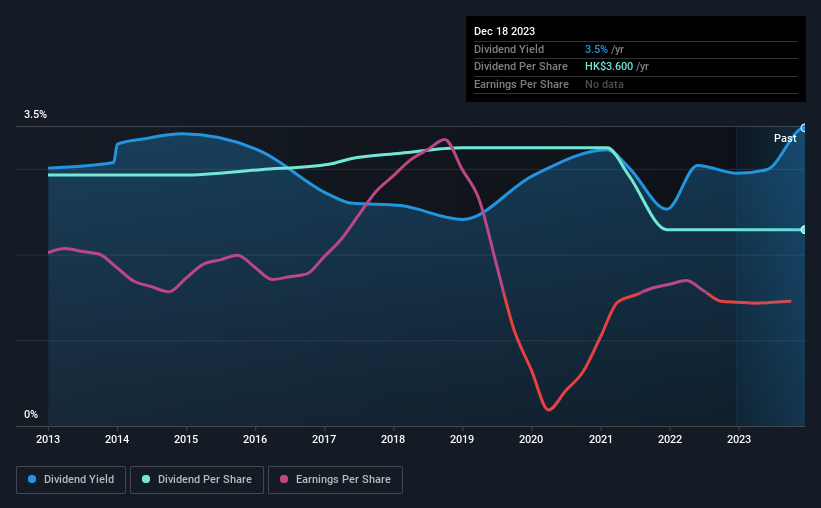The board of Melbourne Enterprises Limited (HKG:158) has announced that it will pay a dividend of HK$1.80 per share on the 15th of February. Including this payment, the dividend yield on the stock will be 3.5%, which is a modest boost for shareholders' returns.
Check out our latest analysis for Melbourne Enterprises
Melbourne Enterprises' Distributions May Be Difficult To Sustain
It would be nice for the yield to be higher, but we should also check if higher levels of dividend payment would be sustainable. Even while not generating a profit, Melbourne Enterprises is paying out most of its free cash flows as a dividend. Paying a dividend while unprofitable is generally considered an aggressive policy, and with limited funds retained for reinvestment, growth may be slow.
Looking forward, earnings per share could 26.8% over the next year if the trend of the last few years can't be broken. This means the company will be unprofitable and managers could face the tough choice between continuing to pay the dividend or taking pressure off the balance sheet.

Dividend Volatility
Although the company has a long dividend history, it has been cut at least once in the last 10 years. The annual payment during the last 10 years was HK$4.60 in 2013, and the most recent fiscal year payment was HK$3.60. This works out to be a decline of approximately 2.4% per year over that time. Generally, we don't like to see a dividend that has been declining over time as this can degrade shareholders' returns and indicate that the company may be running into problems.
The Dividend Has Limited Growth Potential
With a relatively unstable dividend, it's even more important to evaluate if earnings per share is growing, which could point to a growing dividend in the future. Over the past five years, it looks as though Melbourne Enterprises' EPS has declined at around 27% a year. A sharp decline in earnings per share is not great from from a dividend perspective. Even conservative payout ratios can come under pressure if earnings fall far enough.
Melbourne Enterprises' Dividend Doesn't Look Sustainable
Overall, it's nice to see a consistent dividend payment, but we think that longer term, the current level of payment might be unsustainable. The track record isn't great, and the payments are a bit high to be considered sustainable. We would probably look elsewhere for an income investment.
Companies possessing a stable dividend policy will likely enjoy greater investor interest than those suffering from a more inconsistent approach. At the same time, there are other factors our readers should be conscious of before pouring capital into a stock. For instance, we've picked out 2 warning signs for Melbourne Enterprises that investors should take into consideration. Is Melbourne Enterprises not quite the opportunity you were looking for? Why not check out our selection of top dividend stocks.
New: Manage All Your Stock Portfolios in One Place
We've created the ultimate portfolio companion for stock investors, and it's free.
• Connect an unlimited number of Portfolios and see your total in one currency
• Be alerted to new Warning Signs or Risks via email or mobile
• Track the Fair Value of your stocks
Have feedback on this article? Concerned about the content? Get in touch with us directly. Alternatively, email editorial-team (at) simplywallst.com.
This article by Simply Wall St is general in nature. We provide commentary based on historical data and analyst forecasts only using an unbiased methodology and our articles are not intended to be financial advice. It does not constitute a recommendation to buy or sell any stock, and does not take account of your objectives, or your financial situation. We aim to bring you long-term focused analysis driven by fundamental data. Note that our analysis may not factor in the latest price-sensitive company announcements or qualitative material. Simply Wall St has no position in any stocks mentioned.
About SEHK:158
Melbourne Enterprises
An investment holding company, engages in property investment business in Hong Kong.
Flawless balance sheet and slightly overvalued.
Market Insights
Community Narratives



